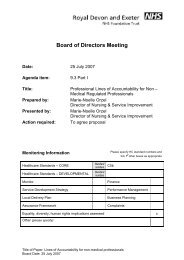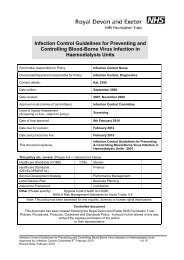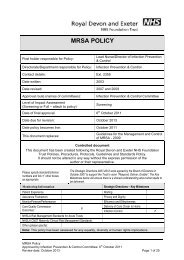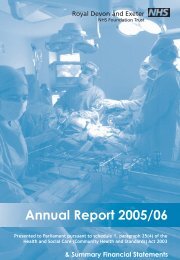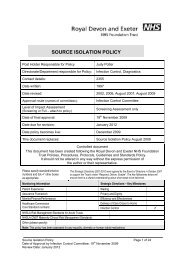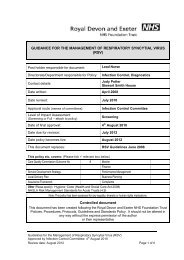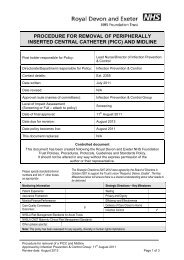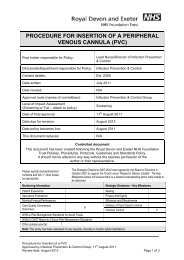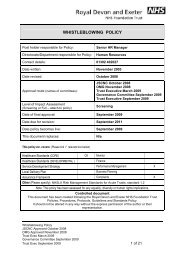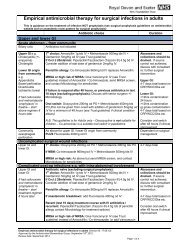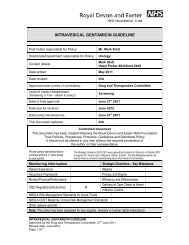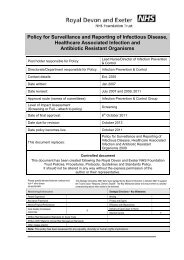Annual Report and Accounts 2012/13 - Royal Devon & Exeter Hospital
Annual Report and Accounts 2012/13 - Royal Devon & Exeter Hospital
Annual Report and Accounts 2012/13 - Royal Devon & Exeter Hospital
You also want an ePaper? Increase the reach of your titles
YUMPU automatically turns print PDFs into web optimized ePapers that Google loves.
2. Progress on our<br />
<strong>2012</strong>/<strong>13</strong> Priorities<br />
<strong>Royal</strong> <strong>Devon</strong> <strong>and</strong> <strong>Exeter</strong> NHS Foundation Trust<br />
Quality <strong>Report</strong> <strong>2012</strong>/<strong>13</strong><br />
11<br />
Forget me not<br />
We introduced the Forget Me Not<br />
campaign to improve communication<br />
with patients who have any form of<br />
mental illness. For this campaign, we<br />
are working with our colleagues in<br />
mental health at <strong>Devon</strong> Partnership<br />
NHS Trust.<br />
Forget Me Not aims to benefit anyone<br />
struggling to communicate their<br />
needs <strong>and</strong> preferences, for whatever<br />
reason. The new campaign symbol,<br />
a Forget Me Not flower, tells staff<br />
that the patient needs a little more<br />
time, sensitivity <strong>and</strong> skill to support<br />
their journey through services. The<br />
campaign symbol is available in<br />
magnetic <strong>and</strong> sticker form so that<br />
it can be placed on the bed, ward<br />
whiteboard, request forms or notes<br />
of any patient displaying symptoms of<br />
cognitive impairment.<br />
This initiative aims to:<br />
• Increase interaction time <strong>and</strong><br />
frequency of contact with patients<br />
• Increase the therapeutic quality of<br />
interactions<br />
• Improve patient <strong>and</strong> carer<br />
experiences<br />
• Promote a culture of<br />
person-centred care<br />
• Reduce staff stress.<br />
Training<br />
Consultant Nurse for Older People,<br />
Debbie Cheeseman, also developed<br />
a training package for all Trust staff.<br />
She held a series of one-hour lectures<br />
throughout February <strong>and</strong> March 20<strong>13</strong>,<br />
which was in plain English <strong>and</strong> suitable<br />
for both clinical staff <strong>and</strong> those in<br />
support services. This will continue into<br />
the new financial year.<br />
As well as highlighting the<br />
demographics which make this such<br />
an important issue for the RD&E, the<br />
training gave staff some top tips on<br />
how to help patients who may be<br />
disorientated or confused.<br />
Top tips when caring for a person with<br />
dementia:<br />
• Remember that this is a person<br />
with dementia <strong>and</strong> not just<br />
symptoms of their condition<br />
• Look for the person behind<br />
the dementia – try to find out<br />
something about their life<br />
• Complete the ‘This is Me’<br />
document with family to give<br />
some insight <strong>and</strong> information into<br />
this person’s life. This can help find<br />
areas for engagement<br />
• About 90% of communication<br />
is non-verbal – think about body<br />
language, gestures <strong>and</strong> facial<br />
expressions<br />
• Effective communication takes<br />
time <strong>and</strong> patience<br />
• Respond to emotions not just<br />
words – does the person seem<br />
unhappy or distressed?<br />
• Ensure the person can see you –<br />
position yourself at their level <strong>and</strong><br />
maintain eye contact<br />
• So called ‘problem behaviour’<br />
is nearly always an attempt to<br />
communicate feelings or needs.<br />
Rather than trying to stop the<br />
behaviour try to work out what<br />
it means<br />
• Focus on what the person can do<br />
<strong>and</strong> play to their strengths<br />
• Involve the family in their care –<br />
they will know the person well<br />
<strong>and</strong> how to respond to things.<br />
Observational audits<br />
Our Nurse Consultant for Older People,<br />
Debbie Cheeseman, introduced a<br />
programme of observational audits<br />
covering all clinical areas in the Trust,<br />
including theatres <strong>and</strong> outpatient<br />
departments. Each area receives two<br />
observations of care: one carried out<br />
by Debbie <strong>and</strong> a Ward Matron <strong>and</strong> the<br />
other carried out by Debbie <strong>and</strong> an<br />
independent observer, who may be a<br />
member of staff from another area or<br />
a student or carer. On each visit, the<br />
observers watch all patient interactions<br />
for an hour. Staff are given immediate<br />
feedback about their approach<br />
towards patients <strong>and</strong> the Matron is<br />
advised of the care observed.<br />
This has been a very powerful teaching<br />
tool for all staff involved. A lot of<br />
excellent care has been seen <strong>and</strong><br />
feedback given so that staff are aware<br />
they should continue to role model<br />
that good behaviour. One consistent<br />
observation is how little eye contact<br />
patients receive from us unless it’s their<br />
‘turn to have care’. This will now form<br />
part of a formal research proposal.<br />
In the meantime this work is being<br />
shared at the one hour awareness<br />
session ‘Our population is changing’ so<br />
that staff are learning how eye contact<br />
particularly affects patients who have a<br />
delirium or dementia.



